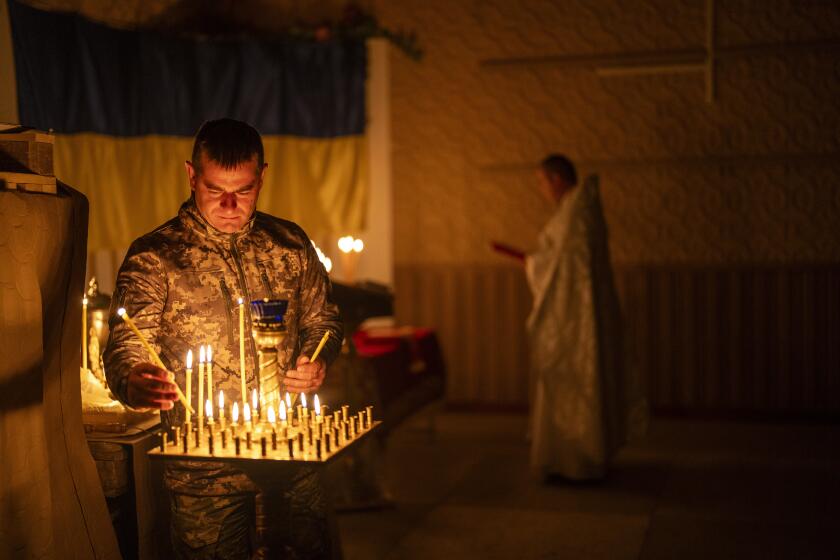Hussein Asserts U.S. Guards Abused Him, Co-Defendants
After listening for hours to witnesses’ accounts of torture at the hands of his regime, Saddam Hussein asserted at his trial Wednesday that he too had been the victim of prison abuse -- by his American captors.
“I was beaten all over my body and the marks are there,” the former Iraqi dictator said, making a new bid to put the United States and its foreign policy on trial instead of his own government. “We were beaten by the Americans and tortured.”
Hussein’s lengthy soliloquy came near the close of Wednesday’s nine-hour court session, which featured long stretches of dramatic and occasionally vivid testimony about retribution allegedly meted out after an assassination attempt on Hussein in 1982 in the village of Dujayl.
The proceedings were punctuated by testy exchanges and politically charged allegations. In the end, it seemed more like a noisy tribal summit, in which squabbling Iraqis often take their differences to a sheik to resolve, than a cold legal delving into facts.
Prosecutors presented three witnesses who described what became of villagers arrested en masse in 1982. They told of molten plastic used to burn prisoners and how children were separated from their parents for years at a time. They described being fed revolting gruel and being forced to drink hot, dirty water.
Rather than seeking to refute the allegations, Hussein, his attorneys and seven co-defendants attempted to counter the charges with attacks on witnesses and the trial’s American backers. At one point, Hussein seemed to acknowledge that people had been mistreated by his government, but in the next breath he redirected the focus to his own alleged suffering.
“Any harm done to these witnesses is wrong and whoever did it must be punished in accordance with the law,” Hussein said. “All that happened in a Third World country, as America says, and 25 years ago. But what is happening now, now, now, now? Ask any of my colleagues if they were not beaten nor have signs of beating.”
Lead prosecutor Jaafar Mousawi, more outspoken and forceful in presenting his case than in previous sessions, raised his voice in indignation.
“I visited you and saw an air conditioner in each room and ordered televisions for you,” he told Hussein. “If you have complaints, I will investigate and bring to court anyone who mistreated you.”
Hussein was contemptuous. “You are going to punish the Americans?” he said. “But they are your bosses.”
Other defendants and attorneys chimed in with their own complaints.
Former Vice President Taha Yassin Ramadan, recalling his first days as an American prisoner, said, “I drank from the ice water they poured on my body while I was half naked. After 22 days they gave me a blue jumpsuit with no underwear. They brought me food I couldn’t eat.”
Barzan Ibrahim Hasan, Hussein’s half brother and intelligence chief, alleged that six or seven of his fellow prisoners had been killed at the hands of the American soldiers.
The defense team, too, complained of maltreatment.
“We were threatened at the airport and brought to a house without bathrooms,” said Najib Nuaimi, a former Qatari justice minister who is advising the defense.
U.S. officials responded to the charges with scorn.
White House Press Secretary Scott McClellan called Hussein’s allegations “preposterous.” The former president, he said, “is being treated the exact opposite of the way his regime treated those he imprisoned and tortured simply for expressing their opinions.”
Many of the witnesses who have taken the stand so far have offered little testimony directly linking any of the defendants to abuses. But Wednesday’s third witness said that Hasan, the intelligence chief, personally interrogated him when he was arrested after the 1982 incident.
Testifying from behind a curtain, he said he was brought to an intelligence office and ordered by unknown officials to confess to being a member of the Dawa Party, then an outlawed Shiite Muslim group with ties to Iran that opposed Hussein.
“I told them that I had no idea what they were talking about,” he said.
The witness said he was then interrogated and tortured 10 times with electrical clamps attached to his thumbs, toes and genitalia. He said he foamed at the mouth and passed out from the pain. Then Hasan came to interrogate him, the witness said.
Hasan threatened to “tear my anus off” if he didn’t confess, the witness said.
Much of the other testimony Wednesday, though, was full of hearsay and contradictions.
The first witness, Ali Hassan Mohammed Heydari, 37, said that one of his brothers was involved in the assassination attempt. At another point, though, he suggested that there might not have been an assassination attempt at all, just celebratory gunfire.
The second witness said he saw Hasan in Dujayl after the incident. But in contrast to some witnesses, he said he saw the intelligence chief doing nothing more nefarious than eating grapes.
He also said his name was on the roster of more than 140 people from Dujayl allegedly executed by Hussein’s regime -- casting doubt on one of the prosecution’s main contentions.
Defense attorneys ripped into witnesses with hazy memories, demanding that they come up with names, dates and specific allegations, and suggesting that they were unintelligent rubes.
“Dujayl has tribal leaders and city leaders,” Hasan said after the third witness testified. “I want someone educated from Dujayl to tell me that this happened to me by this particular person at this time.”
Hasan heaped venomous insults on the first witness, Heydari, who had testified that seven of his brothers were executed. Hasan derided them “as the corpses of seven dirty dogs.”
The judge intervened. “How can you speak so badly of people?”
“They were criminals,” Hasan replied. “If you were our comrade in 1982 you would have taken the same precautions.”
The judge and prosecutor warned Hasan to temper his rhetoric, and they cut off the sound for the delayed TV broadcast. But Hasan was not deterred.
He assailed Heydari as a fraud and liar, saying that the sole of Ramadan’s shoe was “more honorable than you and your tribe.”
Chief Judge Mohammed Rizgar Amin, Heydari and trial observers gasped in shock and the court erupted at the remark, which is a grave insult in Iraq. Prosecutors stood up to object as three burly bodyguards moved toward Hasan.
“Sit down,” one guard said. “I take orders from the judge, not you,” Hasan said.
“I’m going to beat you,” the guard said, before backing off.
Amid the bedlam, Amin raised his voice. “This is not appropriate,” the judge called out. “This is not appropriate.”
More to Read
Start your day right
Sign up for Essential California for news, features and recommendations from the L.A. Times and beyond in your inbox six days a week.
You may occasionally receive promotional content from the Los Angeles Times.






